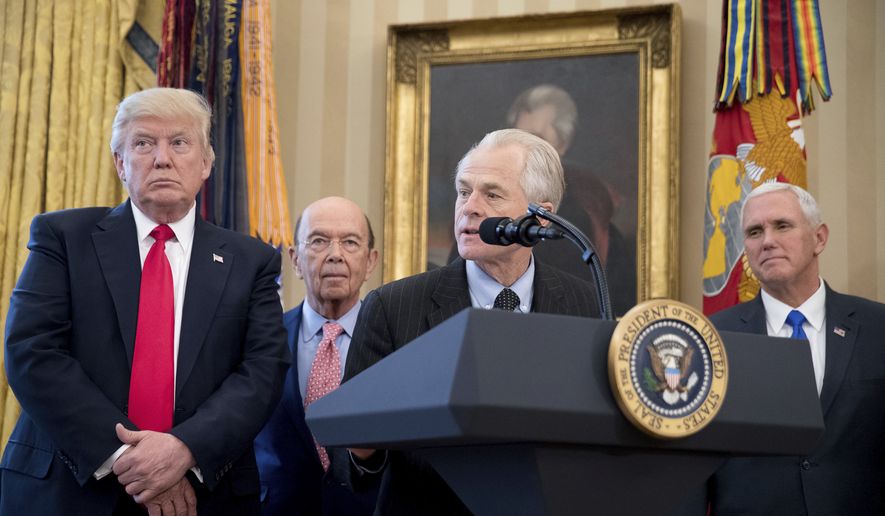OPINION:
This week, the Trump administration announced its three-part plan to deliver $12 billion to farmers to offset losses due to retaliatory tariffs placed on their goods.
President Trump promised the agricultural community that they would not get hurt as he pursues better trade deals and he is trying to keep that promise.
But the problem is that even Agriculture Secretary Sonny Perdue admits that this three-part plan is a ’short-term solution.” What happens when the $12 billion runs out? Mr. Perdue argues that the payout will “give President Trump time to work on a long-term trade policy and deal to benefit agriculture as well as all sectors of the American economy.”
There are two ideas in conflict here: Historically Republicans have opposed tariffs, believing that protectionism is bad trade policy and distorts the free market. But many countries that we compete with heavily subsidize their domestic goods, making it difficult for U.S. producers to compete. Therein lies the rub.
The president has some worthy goals: improving wages, bringing back U.S. manufacturing, working toward reciprocal trade agreements. If achieved, this would be a significant victory — for him and for the country. Whether Wednesday’s breaking news of a possible deal with the European Union on tariff and non-tariff barriers will advance those goals is an open question.
But in the meantime, American producers and manufacturers are bearing the brunt of the costs, as the trade actions that President Trump has taken have resulted in painful retaliatory tariffs from China, Mexico, Canada and the European Union.
AUDIO: Matt Mackowiak with Gregg Keller
The president is being led down this unsuccessful path by Peter Navarro, director of the White House National Trade Council. Mr. Navarro has an unusual background for a senior staffer in the Trump White House.
He’s a graduate of Tufts University and has a Ph.D. from Harvard. Before joining the White House, he was a professor at the University of California at Irvine in their business school. He ran unsuccessfully for office five times as a Democrat in southern California — including for Congress and for mayor of San Diego — between 1992 and 1996. His coziness with Democrats runs deeper. His 2011 book “Death by China” repeatedly cites Richard Trumka, the AFL-CIO president. When Mr. Navarro’s book was made into a documentary, it was narrated by left-wing actor Martin Sheen.
On March 15, after the Trump administration began imposing tariffs by using a rarely-cited national security provision in law, Mr. Navarro was asked if other countries would hit back. He made a bold prediction.
“I think it will be fine if you look at the chessboard,” he told CNBC at the time. “Nobody really has an incentive to pick a fight with us.”
That should go down as one of the worst economic predictions of the modern era.
Nearly every tariff announcement that Mr. Trump has made has been met with equal retaliatory tariffs from our trading partners. The net effect of this is that the cost of goods has increased for consumers.
Capitol Hill Republicans are considering striking back at President Trump’s trade actions, all of which have been done through executive authority.
Conservative Nebraska Sen. Ben Sasse told PBS, “I live in the most productive state in the history of agriculture right now. Our people feed the world. They don’t want bailouts; they want more trade.”
As a tactic, I do not support the use of tariffs. But I was not elected president.
If Mr. Trump was using tariffs to increase U.S. leverage to negotiate better trade deals quickly, that was a laudable goal. But it’s a high-risk approach.
Thankfully in the last 24 hours, Mr. Trump and the European Commission President Jean-Claude Juncker seem to have stepped back from the brink, agreeing to work together to lower tariffs and other trade barriers,. The EU says it’s ready to purchase billions of dollars in U.S. exports for everything from natural gas to soybeans. Mr. Trump had been threatening a 25 percent tariff on European automobiles, a drastic step that would have had global economic consequences.
Across the other ocean, Mr. Trump is still threatening to press forward with $200 billion in new tariffs against China.
Apart from the Juncker announcement — which still leaves much to be negotiated, is there any evidence whatsoever that Mr. Navarro is wisely advising the president?
The result so far has to weaken the economy, raise the price of goods, increase the costs of raw materials, and hurt middle class and blue-collar workers in America’s heartland. Democrats who desperately want to win back the House and shut down Mr. Trump’s agenda for the next two years may be able to do so because of Mr. Navarro’s tariffs.
The GOP Senate Majority could also be at stake: Pennsylvania, Michigan, Ohio, and Wisconsin all have competitive Senate races and trade policy is crucial in those states. Mr. Navarro is jeopardizing Republican pick-up opportunities.
I remain hopeful that Mr. Trump will bring us back from the abyss. The Trump team needs to complete the renegotiation of NAFTA. They should quickly work to secure new free trade deals, reducing tariffs and subsidies and leveling the playing field.
The goal of making America more competitive is a worthy goal. But Peter Navarro is fighting an unwinnable trade war, with reckless tariffs that have already proven politically and economically harmful.
• Matt Mackowiak is president of Austin, Texas, and Washington, D.C.-based Potomac Strategy Group. He’s a Republican consultant, a Bush administration and Bush-Cheney re-election campaign veteran and former press secretary to two U.S. senators. His “Mack on Politics” podcast is available on iTunes, Google Play, Stitcher and on WashingtonTimes.com.




Please read our comment policy before commenting.